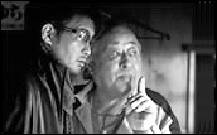|
|
||||
|
|
by Donald Levit  Since making his directorial début less than a decade ago, Takashi Miike has churned films out for TV, straight to video v-cinema, and largely second-tier theatrical release. Technical quality spiking crazily with budget, the in-your-face results are built to shock through violent, often sexual, imagery and treatment of the forbidden. Bizarre mixes of blood and profanity, horror and crime, supernatural and satire, sudden manga action set into long nearly silent stretches, his works disregard logic, an excess of which he claims “will destroy my films.” The only Japanese among Time magazine’s top ten non-Hollywood directors for 1998, Miike denies any grounding in cinema history -- though equally maverick Brazil and Delicatessen lurk there as inspiration -- and is, indeed, more ahead of his time than related to what has gone before. His pseudo-social commentary “Dead or Alive” Trilogy fell flat despite interesting possibilities, and the slow complication of Gozu, too, is at first sight more awkward than not. Miike and frequent screenwriter-collaborator Sakichi Sato do not, however, so much shift gears as keep at it, so that one begins to grasp (as much as one ever will) what they are about. Opinion should be sharply divided, with no middle ground and probably most disliking it, but I suggest that this “Yakuza horror theater” accomplishes in audacious originality what Tarantino’s current two-volumer does not and rivals the effective outlandishness of From Dusk Till Dawn. In seedy color-faded motels, restaurants, “love houses” and urban dumps, goon Minami (Hideki Sone) searches for Ozaki (Sho Aikawa), his crime Aniki, or “older brother.” Nervously over the edge, the latter construes a lapdog as a Yakuza attack threat and splatters it against a window, prompting the gang boss to order his execution. Ozaki once saved his life, so dim, physically endowed and just circumcised Minami is reluctant but accidentally carries out the assignment, only to find the corpse vanished from the back seat of his open convertible car. Stumbling through unfamiliar, nightmarish WARNING: Spoilers Ahead Minami arrives too late. Ozaki has already been mechanically flattened in a car at the crime ring’s auto junkyard, his pressed, tattooed, circumcised hide hung up in a blue plastic sleeve like a suit at the dry cleaner’s. But a kimonoed young lady (Kamika Yoshino) greets the chauffeur/hit man from the rear seat of his Mustang and to his disbelief claims that she is Ozaki. Changing costumes and becoming more sensual from one moment to the next, she is a passive seductress who precipitates two kinkily hilarious copulation scenes. An abrupt, sunlit, arm-in-arm happy ending thumbs a nose at the previous two-hours-plus and pulls us back to “normality”; but, like the film or hate it, our world has gone topsy-turvy. Visuals and characterizations in Gozu are meant to goad response, and the suspicion here is that, outside of a reduced cadre, reaction will be negative. What, exactly, the viewer is supposed to feel is debatable, though perhaps the inducing of visceral, non-rational reaction is in and of itself an end that supersedes causal film “storytelling.” Though not mindless and special-effects bloody like much of today’s fare, Gozu is only for the few who will love it. (Released by Pathfinder Pictures; not rated by MPAA.) |
||
|
© 2025 - ReelTalk Movie Reviews Website designed by Dot Pitch Studios, LLC |



